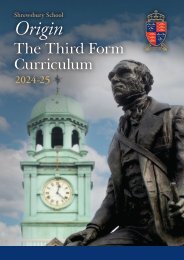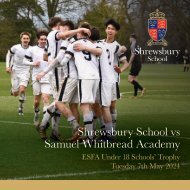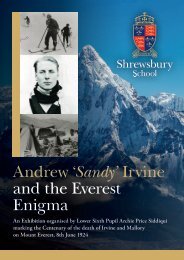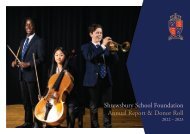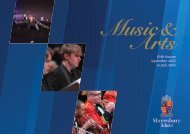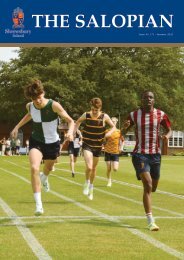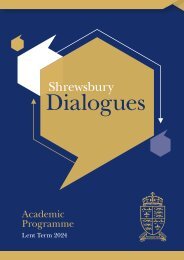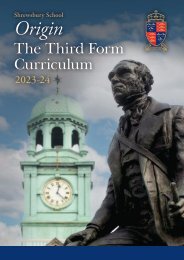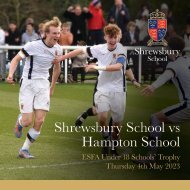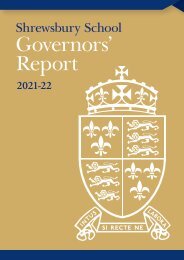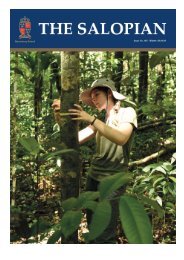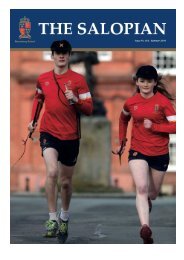The Salopian no. 157 - Winter 2015
You also want an ePaper? Increase the reach of your titles
YUMPU automatically turns print PDFs into web optimized ePapers that Google loves.
OLD SALOPIAN NEWS 79<br />
it engaged a number of German destroyers. It was, he<br />
admitted, a frightening experience. Unfortunately for him,<br />
his period of service was too short to qualify him for a<br />
campaign medal.<br />
In 1946, he emerged from college as a qualified submarine<br />
engineer, in which capacity he served in a number of<br />
vessels. Graduating from the naval staff college, he was<br />
steadily promoted to posts of greater responsibility including<br />
a spell in Whitehall in the Operations Division of Naval<br />
Staff. Here, as elsewhere, he proved to be a successful team<br />
player, a man who got on with people and who retained<br />
a sense of humour under pressure. His personal qualities<br />
were to be of particular value when, in the rank of Captain,<br />
he had the task of preparing the Faslane Nuclear Submarine<br />
Base, which involved negotiating with the representatives<br />
of the civilian workforce which was operating along with<br />
Naval personnel. <strong>The</strong> project was completed in time.<br />
He later became Commodore of the Barracks in Portsmouth,<br />
re-named HMS Nelson at his suggestion. From there he<br />
moved through various Ministry posts, before retiring in the<br />
rank of Vice-Admiral and with a knighthood.<br />
Springfield, his home from 1951 on, was a very happy<br />
place, where Sir John was determined to create the stable<br />
family environment that had been lacking in his youth. A<br />
practical man, he loved to create or mend artefacts, he was<br />
a keen gardener, and when his wife suffered a stroke, he<br />
applied himself to cooking. Involvement in the Hayling<br />
Island community included work for the local church and<br />
membership of the Hayling Horticultural Society, of which<br />
he became President.<br />
An avid cricket enthusiast, he was a member of the MCC<br />
and followed England on tour, was elected President of<br />
Navy Boxing, and followed rugby on television with an<br />
ardour that was just short of participation.<br />
Invited to become a liveryman of the Worshipful Company<br />
of Plumbers, he was to serve a term as Master, just one<br />
more example of his natural gift of leadership.<br />
In spite of the many demands of his career in public life,<br />
Sir John found time for his family, and was a most devoted<br />
father and grandfather. <strong>The</strong> collection of tributes from his<br />
grandchildren, published at his memorial service, is a very<br />
moving record of the contribution to their lives of a man of<br />
many talents. With justifiable pride, his eldest son spoke of<br />
“a life truly well lived”.<br />
Charles Lepper (Staff 1987)<br />
Although Charles Lepper taught English for just two<br />
terms at Shrewsbury, from January 1987, he made an<br />
unforgettable mark, both in the Common Room and with<br />
his pupils. Cheerful, humorous and scholarly, he acted as<br />
an interim between the departure of David Smith and the<br />
arrival of Stephen Holroyd.<br />
Charles had been a professional actor, performing at<br />
Stratford with John Gielgud, before losing much of his<br />
hearing and being obliged to leave the stage. But the<br />
theatre’s loss was undoubtedly a gain for the world of<br />
education. <strong>The</strong>re followed a stay at the Crypt School in<br />
Gloucester and later at Bradfield College, where he was<br />
appointed Head of English. A <strong>no</strong>tably sparkling teacher,<br />
he enhanced the role with his many widely acclaimed<br />
productions of Shakespeare and later with the celebrated<br />
Bradfield Greek Plays. On reaching retirement, Charles<br />
Lepper continued to perform his own one-man adaptation<br />
of Charles Dickens’ <strong>no</strong>vels.<br />
A dedicated freemason, Charles happily joined the<br />
<strong>Salopian</strong> Lodge, continuing as a member for many years.<br />
<strong>The</strong> coat of arms of Shrewsbury School remained on a<br />
shield in Charles’ rooms until his dying day. No one who<br />
encountered him will ever forget his joie de vivre, his<br />
generosity and love of theatre and literature. He died on<br />
27th January <strong>2015</strong>, aged 92.<br />
John Levetus (Ch 1938-42)<br />
<strong>The</strong> youngest of three, John Levetus was born on 22nd<br />
July 1924 to Edward, an import-export merchant, and<br />
Gertrude (née Ashton), a former schoolteacher. <strong>The</strong> family<br />
lived in Hampstead Garden Suburb and made many<br />
enduring friendships with neighbours who shared their<br />
interest in the arts.<br />
John performed well at Shrewsbury School, leaving in 1942<br />
with Higher Certificates in Latin, Greek, and History and<br />
Ancient Literature, and a distinction in Scripture K<strong>no</strong>wledge<br />
(Greek Text). After a year in the Territorial Army, he served<br />
in the Army Intelligence Corps in Britain, India and Ceylon<br />
from 1944 to 1946, learning Mandarin at the School of<br />
Oriental and African Studies.<br />
John then took a two-year History degree course at New<br />
College, Oxford, graduating in 1950. After qualifying as



